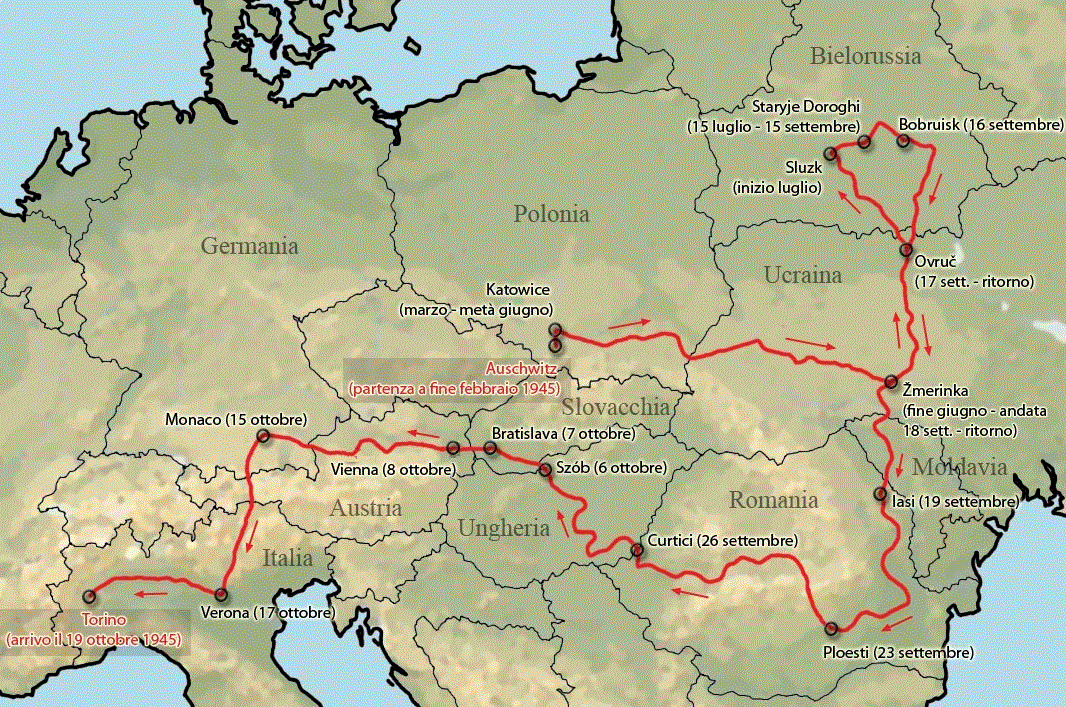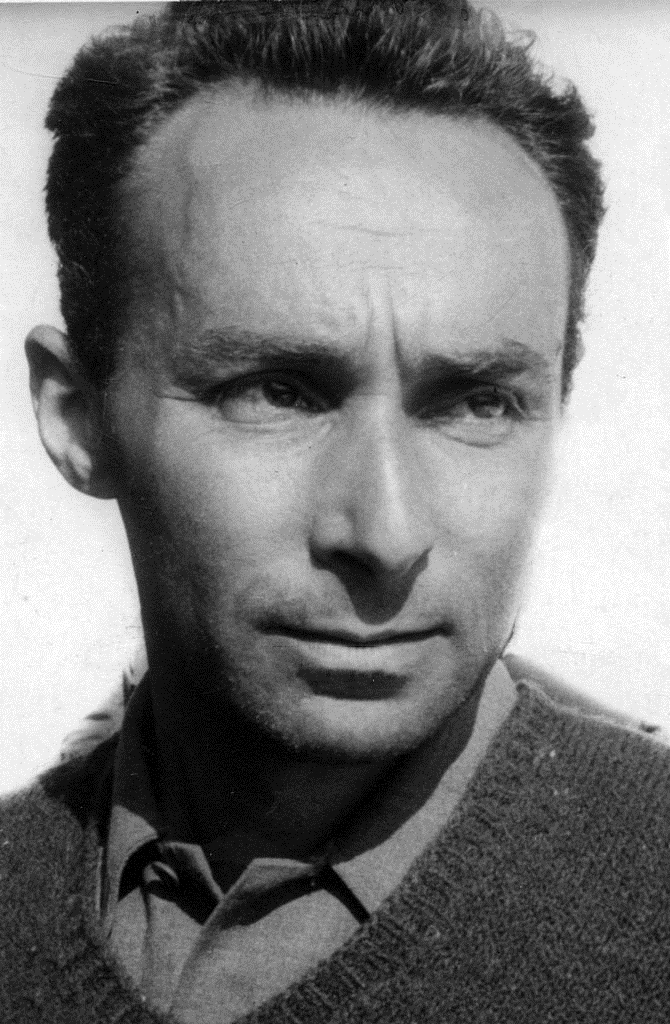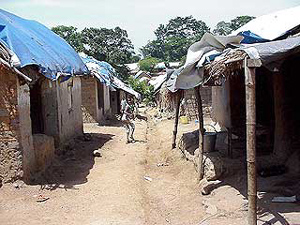|
Staryya Darohi
Staryya Darohi (; ) is a town in Minsk Region, Belarus. It serves as the administrative center of Staryya Darohi District. It is located south-southeast of the capital Minsk. As of 2024, it has a population of 10,898. History In 1939, there were 1,085 Jews living there, making up 28.6% of the total population. There were two synagogues and several Jewish schools. During World War II, in 1941, Jews were imprisoned in a closed ghetto by Germans, some Jews managed to escape before on their own or by train. There was a fenced and guarded ghetto on Kirov street where there was a Jewish school and several houses. A group of Jews was forced to swim into the river and shot by the Germans when they were in the water, but little is known about this massacre. On January 19, 1942, the Jews were murdered in a mass execution at a place known as Kacharka. They were massacred by an SS detachment, assisted by local police. Other categories of victims like prisoners of war were also shot at this ... [...More Info...] [...Related Items...] OR: [Wikipedia] [Google] [Baidu] |
List Of Cities And Towns In Belarus
This is a list of cities and towns in Belarus. Neither the Belarusian nor the Russian language makes a distinction between "city" and "town" as English does; the word ''horad'' ( ) or ''gorod'' ( ) is used for both. Overview Belarusian legislation uses a three-level hierarchy of town classifications. According to the Law under May 5, 1998, the categories of the most developed urban localities in Belarus are as follows: * ''capital'' — Minsk; * ''city of regional subordinance'' (; ) — urban locality with a population of not less than 50,000 people; it has its own body of self-government, known as ''Council of Deputies'' (; ) and an executive committee (; ), which stand on the level with these of a ''raion'' (). * ''city of district subordinance'' (; ) — urban locality with a population of more than 6,000 people; it may have its own body of self-government (; ) and an executive committee (; ), which belong to the same level as these of rural councils and of s.c. ''haradski p ... [...More Info...] [...Related Items...] OR: [Wikipedia] [Google] [Baidu] |
Ghetto
A ghetto is a part of a city in which members of a minority group are concentrated, especially as a result of political, social, legal, religious, environmental or economic pressure. Ghettos are often known for being more impoverished than other areas of the city. Versions of such restricted areas have been found across the world, each with their own names, classifications, and groupings of people. The term was originally used for the Venetian Ghetto in Venice, Italy, as early as 1516, to describe the part of the city where Jewish people were restricted to live and thus segregated from other people. However, other early societies may have formed their own versions of the same structure; words resembling ''ghetto'' in meaning appear in Hebrew, Yiddish, Italian, Germanic, Polish, Corsican, Old French, and -4; we might wonder whether there's a point at which it's appropriate to talk of the beginnings of French, that is, when it wa ..., and Latin. During the Holocaust">Latin"> ... [...More Info...] [...Related Items...] OR: [Wikipedia] [Google] [Baidu] |
Populated Places In Minsk Region
Population is a set of humans or other organisms in a given region or area. Governments conduct a census to quantify the resident population size within a given jurisdiction. The term is also applied to non-human animals, microorganisms, and plants, and has specific uses within such fields as ecology and genetics. Etymology The word ''population'' is derived from the Late Latin ''populatio'' (a people, a multitude), which itself is derived from the Latin word ''populus'' (a people). Use of the term Social sciences In sociology and population geography, population refers to a group of human beings with some predefined feature in common, such as location, race, ethnicity, nationality, or religion. Ecology In ecology, a population is a group of organisms of the same species which inhabit the same geographical area and are capable of interbreeding. The area of a sexual population is the area where interbreeding is possible between any opposite-sex pair within the ... [...More Info...] [...Related Items...] OR: [Wikipedia] [Google] [Baidu] |
FC Starye Dorogi
FC Starye Dorogi is a Belarusian football club based in Staryya Darohi (Starye Dorogi), Minsk Oblast. History FC Starye Dorogi was formed in 1986 as ''Vympel Starye Dorogi'' and started playing in Belarusian SSR Top League the same year. In 1987, the team was renamed to ''Stroitel Starye Dorogi''. Since 1992, Stroitel was playing in the Belarusian Premier League. They spent there three seasons until the relegation in 1994. Since then, the club's results were getting progressively worse. Between 1994 and 1997, Stroitel was playing in the Belarusian First League The Belarusian First League () is the second tier of professional association football, football in Belarus. It was created in 1992, following the Belarusian independence. History and format The typical format of the league involves 16 clubs playi .... In 1996, they lost all 24 games and finished in last, 13th place, but were saved from relegation due to the First League expansion to 16 teams. In 1997, they again finishe ... [...More Info...] [...Related Items...] OR: [Wikipedia] [Google] [Baidu] |
Displaced Person
Forced displacement (also forced migration or forced relocation) is an involuntary or coerced movement of a person or people away from their home or home region. The UNHCR defines 'forced displacement' as follows: displaced "as a result of persecution, conflict, generalized violence or human rights violations". A forcibly displaced person may also be referred to as a "forced migrant", a "displaced person" (DP), or, if displaced within the home country, an "internally displaced person" (IDP). While some displaced persons may be considered refugees, the latter term specifically refers to such displaced persons who are receiving legally-defined protection and are recognized as such by their country of residence and/or international organizations. Forced displacement has gained attention in international discussions and policy making since the European migrant crisis. This has since resulted in a greater consideration of the impacts of forced migration on affected regions outside ... [...More Info...] [...Related Items...] OR: [Wikipedia] [Google] [Baidu] |
The Truce
''The Truce'' (), titled ''The Reawakening'' in the US, is a book by the Italian author Primo Levi. It is the sequel to ''If This Is a Man'' and describes the author's experiences from the liberation of Auschwitz ( Monowitz), which was a concentration camp A concentration camp is a prison or other facility used for the internment of political prisoners or politically targeted demographics, such as members of national or ethnic minority groups, on the grounds of national security, or for exploitati ..., until he reaches home in Turin, Italy, after a long journey. He describes the situation in different Displaced persons camps in post-World War II Europe, displaced persons camps after the Second World War. Summary The historian Fritz Stern, in a brief review on ''Foreign Affairs'', wrote that ''The Reawakening'' "charts Levi's incredibly circular return to Italy via Eastern Europe and the Soviet Union. Here people and landscapes come vividly alive in a bizarre, often comical s ... [...More Info...] [...Related Items...] OR: [Wikipedia] [Google] [Baidu] |
Primo Levi
Primo Michele Levi (; 31 July 1919 – 11 April 1987) was a Jewish Italian chemist, partisan, Holocaust survivor and writer. He was the author of several books, collections of short stories, essays, poems and one novel. His best-known works include: '' If This Is a Man'' (''Se questo è un uomo'', 1947, published as ''Survival in Auschwitz'' in the United States), his account of the year he spent as a prisoner in the Auschwitz concentration camp in Nazi-occupied Poland; and '' The Periodic Table'' (1975), a collection of mostly autobiographical short stories, each named after a chemical element which plays a role in each story, which the Royal Institution named the best science book ever written. Levi died in 1987 from injuries sustained in a fall from a third-storey apartment landing. His death was officially ruled a suicide, although that has been disputed by some of his friends and associates and attributed to an accident. Biography Early life Levi was born in 1919 i ... [...More Info...] [...Related Items...] OR: [Wikipedia] [Google] [Baidu] |
Displaced Persons Camp
A refugee camp is a temporary settlement built to receive refugees and people in refugee-like situations. Refugee camps usually accommodate displaced people who have fled their home country, but camps are also made for internally displaced people. Usually, refugees seek asylum after they have escaped war in their home countries, but some camps also house environmental and economic migrants. Camps with over a hundred thousand people are common, but as of 2012, the average-sized camp housed around 11,400. They are usually built and run by a government, the United Nations, international organizations (such as the International Committee of the Red Cross), or non-governmental organization. Unofficial refugee camps, such as Idomeni in Greece or the Calais jungle in France, are where refugees are largely left without the support of governments or international organizations. Refugee camps generally develop in an impromptu fashion with the aim of meeting basic human needs for ... [...More Info...] [...Related Items...] OR: [Wikipedia] [Google] [Baidu] |
World War II
World War II or the Second World War (1 September 1939 – 2 September 1945) was a World war, global conflict between two coalitions: the Allies of World War II, Allies and the Axis powers. World War II by country, Nearly all of the world's countries participated, with many nations mobilising all resources in pursuit of total war. Tanks in World War II, Tanks and Air warfare of World War II, aircraft played major roles, enabling the strategic bombing of cities and delivery of the Atomic bombings of Hiroshima and Nagasaki, first and only nuclear weapons ever used in war. World War II is the List of wars by death toll, deadliest conflict in history, causing World War II casualties, the death of 70 to 85 million people, more than half of whom were civilians. Millions died in genocides, including the Holocaust, and by massacres, starvation, and disease. After the Allied victory, Allied-occupied Germany, Germany, Allied-occupied Austria, Austria, Occupation of Japan, Japan, a ... [...More Info...] [...Related Items...] OR: [Wikipedia] [Google] [Baidu] |
Belarus
Belarus, officially the Republic of Belarus, is a landlocked country in Eastern Europe. It is bordered by Russia to the east and northeast, Ukraine to the south, Poland to the west, and Lithuania and Latvia to the northwest. Belarus spans an area of with a population of . The country has a hemiboreal climate and is administratively divided into Regions of Belarus, six regions. Minsk is the capital and List of cities and largest towns in Belarus, largest city; it is administered separately as a city with special status. For most of the medieval period, the lands of modern-day Belarus was ruled by independent city-states such as the Principality of Polotsk. Around 1300 these lands came fully under the Grand Duchy of Lithuania and subsequently by the Polish–Lithuanian Commonwealth; this period lasted for 500 years until the Partitions of Poland, 1792-1795 partitions of Poland-Lithuania placed Belarus within the Belarusian history in the Russian Empire, Russian Empire for the fi ... [...More Info...] [...Related Items...] OR: [Wikipedia] [Google] [Baidu] |
Minsk
Minsk (, ; , ) is the capital and largest city of Belarus, located on the Svislach (Berezina), Svislach and the now subterranean Nyamiha, Niamiha rivers. As the capital, Minsk has a special administrative status in Belarus and is the administrative centre of Minsk region and Minsk district. it has a population of about two million, making Minsk the Largest cities in Europe, 11th-most populous city in Europe. Minsk is one of the administrative capitals of the Commonwealth of Independent States (CIS) and the Eurasian Economic Union (EAEU). First mentioned in 1067, Minsk became the capital of the Principality of Minsk, an appanage of the Principality of Polotsk, before being annexed by the Grand Duchy of Lithuania in 1242. It received town privileges in 1499. From 1569, it was the capital of Minsk Voivodeship, an administrative division of the Polish–Lithuanian Commonwealth. It was part of the territories annexed by the Russian Empire in 1793, as a consequence of the Second Part ... [...More Info...] [...Related Items...] OR: [Wikipedia] [Google] [Baidu] |








